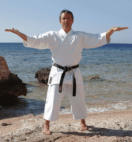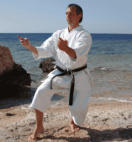karatekata
Development of Kata
It
was
a
monk
named
Bodhidharma
who
brought
a
number
of
gymnastic
exercises
to
the
Shaolin.
These
exercises
was
for
to
improve
the
health
and
the
power
of
the
body.
Today
we
can
see
these
exercises
as
the
roots
of
the
Kata.
Based
on
this
first
methods
of
selfdefence
has
been
found.
On
the
research
for
new
and
better
fighting
methods
they
did
watch
and
imitate
the
ways
how
animals
prey
and
fight.
The
methods
of
the
animals
has
been
translated
to
a
human
form
and
got
part
of
Kata.
From
single
movements
to
groups
of
movements
and
to
a
whole
and
complex
form
the
Kata
became the number one for teaching martial arts.
For
each
way
of
teachement
of
knowledge
it
needs
a
usable
method.
If
the
goal
is
to
teach
body
skills
it
is
necessary
to
show
the
movement.
A
theoretical
explanation
is
not
enough.
Also
it’s
important
to
save
this
knowledge
for
the
future.
This
happens
in
the
Martial
Arts,
as
well
as
in
other
disciplines
like
dancing
for
example.
It's
not
wrong
to
believe
that
the
monks
of
Shaolin
did
see
the
value
of
the
possibilities
to
practise,
to
teach
and
to
hand
down
the
knowledge
of
the
Martial Arts in the way of a kind of dancing forms.
Another
advantage
was,
that
it
was
possible
to
improve
the
own
skills
without
to
show
too
much
of
the
true
fighting
methods
to
spectators.
Also
it
made
it
possible
to
teach
the
Martial
Arts
basicly
over
a
time,
which
could
be
used
for
to
learn
more
about
the
students
mentality,
before
teaching
the
true
and
dangerous
methods
to
him.
In
this
view
the
Kata
is
an
excellent
method
for
to
hand
down the knowledge about the Martial Arts with responsibility.
During
hundred
of
years
an
uncountable
number
of
Kata
has
been
found.
Nearly
each
Master
did
create
an
own
one.
The
lot
of
them
are
based
on
the
translation
of
animal
fighting
techniques
to
the
human
possibilities.
Well
known
ar
ethe
schools
of
White
Crane,
Tiger,
Snake,
Leopard,
Dragon,
Eagle
and
praying
Mantis.
But
also
the
movements
of
a
drunken
person
was
analyst
for
to
build
a
highily effective fighting method.
It
is
known
that
contact
between
Chinese
and
the
Islands
of
the
Ryu
Kyu
Archipel,
which
was
independet
from
Japan
in
this
area
did
start
in
the
14th.
century.
Of
course
there
was
an
Art
of
figthing
there
called
Tòde.
But
the
chinese
methods
was
more
advanced.
And
the
chinese
handed
down
their
knowledge
about
the
Martial
Arts.
But
if
we
compare
the
chinese
Martial
Arts
and
the
present
Schools
of
Okinawa
we
can
see
strong
differences.
It
is
for
sure
that
most
of
the
Kata
used
in
Okinawa
have
chinese
roots,
but
clear
to
see,
that
this
Kata
have
big
differences
from
the
chinese original forms.
Each
nation
has
it's
own
typical
properties
in
body
structur,
culture
and
mentality.
And
so
the
okinwan
didn’t
take
over
the
chinese
methods
without
to
change
them
in
the
way
of
there
own
imagines
of
the
way
of
fighting.
Not
only
the
movements
of
a
Kata
has
been
changed,
but
also
it’s
spirit.
So
the
Kata
of
Okinawa
have
not
the
high
speed
of
the
chinese
forms,
were
the
techniques
will
be
performed
without
any
break.
On
the
other
hand
okinwan
Kata
have
more
explosivity
in
single techniques and have more attention in the way of dynamic performing.
As
good
as
in
China
nearly
each
Master
had
his
own
kata.
Masters
of
Okinawa
did
adjust
the
Kata
to
theirs
own
meanings.
For
to
do
this
properly
a
Master
has
to
have
a
highly
knowledge
about
the
biomechanic
and
the
true
Bunkai
of
the
techniques.
So
a
lot
of
Masters
like
Yasutsune
Itosu
or
Kenwa Mabuni did create own Kata later in their life.
Today
no
only
at
Okinawa
a
lot
of
versions
of
the
same
Kata
exist.
As
long
as
changes
are
done
on
a
way
that
the
positive
effect
for
training
of
the
Kata
isn't
disturbed
and
as
long
as
the
Bunkai
is
possible, these changes are good for the vitality of the Kata and the Marital Arts.
As
the
people
of
Okinawa
did
learn
the
Martial
Arts
from
Chinese
Master
they
didn't
adjust
the
Art
to
their
meanings
immediatly.
This
development
happens
slowly
and
over
a
time
of
generations.
Because
of
this
that
Karate
was
made
public
worldwide
not
before
the
middle
of
the
20th.
century
we
cannot
see
an
adjustment
of
Karate
to
the
typcial
properties
of
the
people
from
the
different
nations
by
now.
But
it
is
to
see
hat
this
has
it's
beginnings.
In
the
way
of
regional
mentality
the
Karate
start
to
get
special
interpretation
of
doing
the
Kata.
Some
prefere
a
powerfull
and
strong
technique,
others
like
to
practise
more
speed
and
elegance.
These
is
also
a
reason
for
the
fact
that
the different schools of Karate has different success.
In
the
time
when
the
dogma
that
a
Kata
is
unchangeable
losing
it's
power,
the
development
from
the
traditional
Karate
to
a
regional
typical
Karate
will
begin.
Of
course
this
will
include
the
risk
of
a
fault
Karate
and
the
lost
of
quality
and
knowledge.
But
my
opinion
is
that
Karate
has
to
adjust
to
the praticioner and not the practicioner has to adjust to Karate.
On
the
end
it
means
that
it
is
the
way
to
an
individual
Karat.
A
Karate
like
it
was
normal
in
the
time when Karate did start it's way in Okinawa.







karatekata

Development of Kata
It
was
a
monk
named
Bodhidharma
who
brought
a
number
of
gymnastic
exercises
to
the
Shaolin.
These
exercises
was
for
to
improve
the
health
and
the
power
of
the
body.
Today
we
can
see
these
exercises
as
the
roots
of
the
Kata.
Based
on
this
first
methods
of
selfdefence
has
been
found.
On
the
research
for
new
and
better
fighting
methods
they
did
watch
and
imitate
the
ways
how
animals
prey
and
fight.
The
methods
of
the
animals
has
been
translated
to
a
human
form
and
got
part
of
Kata.
From
single
movements
to
groups
of
movements
and
to
a
whole
and
complex
form
the
Kata
became
the
number one for teaching martial arts.
For
each
way
of
teachement
of
knowledge
it
needs
a
usable
method.
If
the
goal
is
to
teach
body
skills
it
is
necessary
to
show
the
movement.
A
theoretical
explanation
is
not
enough.
Also
it’s
important
to
save
this
knowledge
for
the
future.
This
happens
in
the
Martial
Arts,
as
well
as
in
other
disciplines
like
dancing
for
example.
It's
not
wrong
to
believe
that
the
monks
of
Shaolin
did
see
the
value
of
the
possibilities
to
practise,
to
teach
and
to
hand
down
the
knowledge
of
the
Martial
Arts
in
the
way
of
a
kind
of
dancing forms.
Another
advantage
was,
that
it
was
possible
to
improve
the
own
skills
without
to
show
too
much
of
the
true
fighting
methods
to
spectators.
Also
it
made
it
possible
to
teach
the
Martial
Arts
basicly
over
a
time,
which
could
be
used
for
to
learn
more
about
the
students
mentality,
before
teaching
the
true
and
dangerous
methods
to
him.
In
this
view
the
Kata
is
an
excellent
method
for
to
hand
down
the
knowledge
about
the
Martial
Arts
with
responsibility.
During
hundred
of
years
an
uncountable
number
of
Kata
has
been
found.
Nearly
each
Master
did
create
an
own
one.
The
lot
of
them
are
based
on
the
translation
of
animal
fighting
techniques
to
the
human
possibilities.
Well
known
ar
ethe
schools
of
White
Crane,
Tiger,
Snake,
Leopard,
Dragon,
Eagle
and
praying
Mantis.
But
also
the
movements
of
a
drunken
person
was analyst for to build a highily effective fighting method.
It
is
known
that
contact
between
Chinese
and
the
Islands
of
the
Ryu
Kyu
Archipel,
which
was
independet
from
Japan
in
this
area
did
start
in
the
14th.
century.
Of
course
there
was
an
Art
of
figthing
there
called
Tòde.
But
the
chinese
methods
was
more
advanced.
And
the
chinese
handed
down
their
knowledge
about
the
Martial
Arts.
But
if
we
compare
the
chinese
Martial
Arts
and
the
present
Schools
of
Okinawa
we
can
see
strong
differences.
It
is
for
sure
that
most
of
the
Kata
used
in
Okinawa
have
chinese
roots,
but
clear
to
see,
that
this
Kata
have
big
differences
from
the chinese original forms.
Each
nation
has
it's
own
typical
properties
in
body
structur,
culture
and
mentality.
And
so
the
okinwan
didn’t
take
over
the
chinese
methods
without
to
change
them
in
the
way
of
there
own
imagines
of
the
way
of
fighting.
Not
only
the
movements
of
a
Kata
has
been
changed,
but
also
it’s
spirit.
So
the
Kata
of
Okinawa
have
not
the
high
speed
of
the
chinese
forms,
were
the
techniques
will
be
performed
without
any
break.
On
the
other
hand
okinwan
Kata
have
more
explosivity
in
single
techniques
and have more attention in the way of dynamic performing.
As
good
as
in
China
nearly
each
Master
had
his
own
kata.
Masters
of
Okinawa
did
adjust
the
Kata
to
theirs
own
meanings.
For
to
do
this
properly
a
Master
has
to
have
a
highly
knowledge
about
the
biomechanic
and
the
true
Bunkai
of
the
techniques.
So
a
lot
of
Masters
like
Yasutsune
Itosu
or
Kenwa
Mabuni
did
create
own Kata later in their life.
Today
no
only
at
Okinawa
a
lot
of
versions
of
the
same
Kata
exist.
As
long
as
changes
are
done
on
a
way
that
the
positive
effect
for
training
of
the
Kata
isn't
disturbed
and
as
long
as
the
Bunkai
is
possible,
these
changes
are
good
for
the
vitality
of
the
Kata and the Marital Arts.
As
the
people
of
Okinawa
did
learn
the
Martial
Arts
from
Chinese
Master
they
didn't
adjust
the
Art
to
their
meanings
immediatly.
This
development
happens
slowly
and
over
a
time
of
generations.
Because
of
this
that
Karate
was
made
public
worldwide
not
before
the
middle
of
the
20th.
century
we
cannot
see
an
adjustment
of
Karate
to
the
typcial
properties
of
the
people
from
the
different
nations
by
now.
But
it
is
to
see
hat
this
has
it's
beginnings.
In
the
way
of
regional
mentality
the
Karate
start
to
get
special
interpretation
of
doing
the
Kata.
Some
prefere
a
powerfull
and
strong
technique,
others
like
to
practise
more
speed
and
elegance.
These
is
also
a
reason
for
the
fact
that the different schools of Karate has different success.
In
the
time
when
the
dogma
that
a
Kata
is
unchangeable
losing
it's
power,
the
development
from
the
traditional
Karate
to
a
regional
typical
Karate
will
begin.
Of
course
this
will
include
the
risk
of
a
fault
Karate
and
the
lost
of
quality
and
knowledge.
But
my
opinion
is
that
Karate
has
to
adjust
to
the
praticioner
and
not
the practicioner has to adjust to Karate.
On
the
end
it
means
that
it
is
the
way
to
an
individual
Karat.
A
Karate
like
it
was
normal
in
the
time
when
Karate
did
start
it's
way in Okinawa.















































































